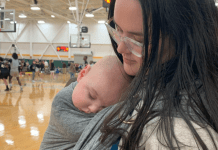When it came time to introduce solid food to my child, he was sick all the time. In between ear infections, colds, congestion — and all the craziness that comes when a child isn’t feeling well — he turned a year old. We began introducing solids and whole milk, but it was difficult. We communicated with our pediatrician often during this time to make sure we were providing him with all of the nutrition he needed to thrive. However, we quickly realized we needed the expertise of a feeding specialist and began our experience with feeding therapy.
During meals, my child would refuse to eat solid foods. I did a lot of internet research to figure out how to help my child enjoy eating solid foods. I followed Instagram accounts, took free and paid online courses, and attempted to try all kinds of feeding techniques to encourage eating solids.
 Working with a Feeding Specialist
Working with a Feeding Specialist
After three months of no consistency with eating, I looked up some professionals in the area for some one-on-one attention. (There is a shortage of occupational therapists in the area, so there might be a long wait for a new patient if you’re encountering the same struggle.) Here are a few DC area feeding specialists:
- April Anderson Therapy
- Ally Behavior Center (Rockville and Silver Spring, MD)
- April Anderson Therapy
- Connections Therapy Center (Lanham, MD)
- First Stages Feeding Specialists (Reston, VA)
- Help Me Speak, LLC (Marriotsville, MD)
- Hungry Elephants Feeding and Swallowing Therapy (MD)
- Inova Children’s Rehab Center (Falls Church, VA)
- Kennedy Krieger Institute
- Kid Connections (Severna Park, MD)
- Little Sprout Therapy (Bethesda, MD)
- National Therapy Center (several locations)
- Pediatric Therapy Specialists (Fairfax, VA)
- Playwell DC
- Skills on the Hill Pediatric Therapy (DC & VA)
- Spectrum Pediatrics (Alexandria, VA)
- Verbal Beginnings (Columbia, MD)
I found an available feeding specialist that could assess and fill out the detailed questionnaire for the initial evaluation. The questionnaire asks detailed questions like your child’s favorite and least favorite foods, how your labor and pregnancy went, how the early feeding journey went, and what kind of environment your child lives in, such as with pets, grandparents in the home, etc.
After this extensive questionnaire, I had an introductory phone call with the Speech Language Pathologist (SLP). She gave me a rundown of what she will do during the official evaluation, asked for more background information, and made sure all my questions were answered.
The Official Feeding Specialist Evaluation
Between the introductory call and the evaluation meeting, I started a log of how, when, where, and what my child was eating. I was as detailed as I could be, including the time of the meal, if it was a snack or a meal or a bottle, what was included on the plate, how long he ate, what he did during the duration of the meal, if someone was eating at the same time, etc.
When the day of the evaluation came, I sent the Feeding Specialist the food diary so she had an idea of typical behaviors at home, and a trend to review. I brought a series of various textured foods and the typical cutlery and plates my child uses on a daily basis. During the evaluation, we went to her office. She had a comfortable space for the child to eat, with a high chair and several supplies such as various cups, plates, silverware etc.
During the evaluation, the SLP asked us several questions. Because it was around lunchtime, we quickly put my child in the high chair and gave him the food I brought to the evaluation. He was definitely shy since this was a new environment and with a new person, but the feeding specialist was very friendly, observant, and offered suggestions and new cups and methodologies to eat better.
There were moments of eager discovery for my child and other moments that were overwhelming for him. The feeding specialist handled all situations with grace and professionalism and always made sure my child was safe. I was involved and we had the ability to pivot and do what was comfortable for my child.
Our Takeaway from the SLP
Overall, we were very happy and felt understood. We received a report of our session with some homework to do. Sometimes trying new things and turning to professionals can seem daunting, especially for something as seemingly easy as feeding a child. However, instead of being frustrated, we learned from the best and left with tools to use at home. We are looking forward to our future sessions.
If your child is struggling with eating, know you aren’t alone and there is help! We hope article encourages you to make that call or schedule that appointment. Have you worked with a feeding specialist?














